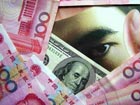| Videos | ? Latest |
|
? Feature | ? Sports | ? Your Videos |
Experts: Yuan exchange rate not to blame

US politicians have long alleged that the Renminbi exchange rate is a key factor behind the trade imbalance between China and the US. However, at a seminar held by the Carnegie Endowment for International Peace in Washington D.C., participants rejected this idea, saying history has proven that China does not manipulate the exchange rate of the yuan.

American economists attending the seminar say it's not a good strategy for the Chinese economy to let the yuan appreciate. They added that China's trade surplus does not indicate that the yuan is undervalued. They say a stable Renminbi has contributed a lot to the recovery of the global economy.
Professor Pieter Bottelier from John Hopkins University, said, "I don't think the term manipulation is suit to the Chinese situation at all. "
Experts have also spoken highly of the quick and effective stimulus measures the Chinese government took to tackle shrinking global demand.
Professor Pieter Bottelier said, "It's very successful because it pulled China and many neighboring counties in Asia out of the hole."
Echoing the experts, the Vice President of the Chinese Academy of Social Sciences says a stable yuan is good for global economic recovery.
Li Yang, vice president of Chinese Academy of Social Sciences, said, "The United States is always saying that low prices of Chinese products have hurt America's traditional industries. This tends to ignore the fact that cheap Chinese products have kept commodity prices in the US at a relatively low level. Furthermore, China's trade surplus has accumulated a large amount of foreign exchange assets. It actually supported the US government's bailout plans, because America has a huge deficit whether it is from the banks or from the government. The US needs a creditor. The current situation in China is helping the US economy warm up. "
Li Yang also mentioned that leaders of major countries have endeavored to stop the economic freefall through cooperation. However, some leaders and economists criticize China, putting pressure on the country. This is not good for cooperation. Li Yang adds that the exchange rate is also a matter of sovereignty and therefore it's not appropriate for other countries to intervene.
 0
0 






